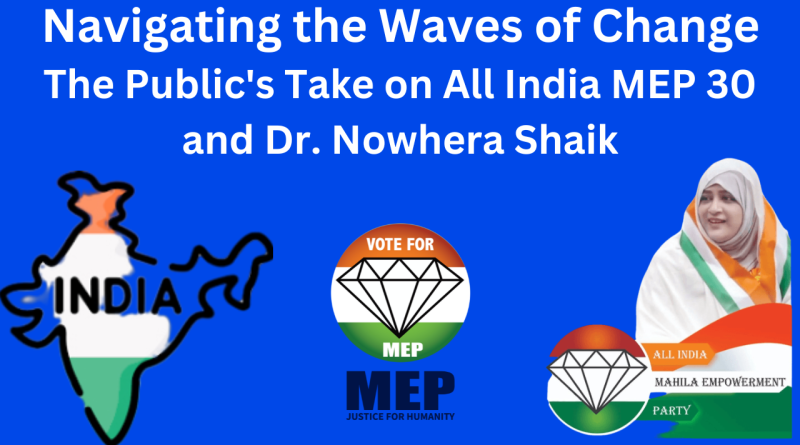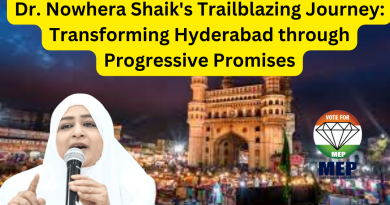Navigating the Waves of Change: The Public’s Take on All India MEP 30 and Dr. Nowhera Shaik
In the realm of Indian politics and social entrepreneurship, few stories are as compelling as that of Dr. Nowhera Shaik and her brainchild, the All India Mahila Empowerment Party (MEP 30). As a figure who has stirred both admiration and controversy, Dr. Shaik’s journey and her party’s current status have become focal points for public scrutiny and debate. This article delves into the mosaic of public opinions, analyzing what this could mean for the future of Indian politics and women’s empowerment.
The Genesis of MEP 30 and Dr. Shaik’s Vision
Dr. Nowhera Shaik founded the All India Mahila Empowerment Party with a vision that was revolutionary at its core – to serve as a beacon of hope and a catalyst for the empowerment of women across India. Her mission was grounded in the belief that true social progress requires the active participation and leadership of women in all spheres of life.
- A Brief Look into MEP 30’s Ideology:
- Championing women’s rights and equality.
- Advocating for economic empowerment and entrepreneurship.
- Addressing social issues such as education, healthcare, and gender-based violence.
Despite facing significant challenges, including skepticism and opposition from established political entities, Dr, Shaik persevered, underscoring her commitment and belief in her cause.
Public Perspectives: A Mixed Bag of Opinions
As with any political entity, public opinions about Dr. Nowhera Shaik and the MEP 30 are diverse and multifaceted. Understanding these views offers valuable insights into the party’s impact and areas for growth.
Support and Admiration
Among the supporters, Dr. Shaik is seen as a trailblazer. Here are a few reasons behind the admiration:
- Unwavering Dedication to Women’s Empowerment:
- Her focus on education and entrepreneurship has resonated with many, viewing them as the pillars of empowerment.
- Challenging the Status Quo:
- By entering the political fray, she has inspired other women to voice their opinions and fight for their rights in a male-dominated sphere.
Criticism and Skepticism
Conversely, there are those who critique her methods and question the efficacy of MEP 30 in bringing about tangible change:
- Questions About Sustainability and Impact:
- Critics argue that while the intentions behind MEP 30 are noble, the execution and long-term sustainability of its initiatives are still up for debate.
- Political Dynamics and Challenges:
- The complex landscape of Indian politics means that the MEP 30 faces formidable challenges in gaining traction and making significant political inroads.
Looking Ahead: The Road Forward for MEP 30
The journey of the All India Mahila Empowerment Party and Dr. Nowhera Shaik is far from over. As they navigate the turbulent waters of Indian politics, several key areas emerge as crucial for their continued relevance and impact:
- Strengthening Grassroots Engagement:
- Deepening connections with local communities to understand and address their unique needs.
- Broadening the Platform:
- While women’s empowerment remains a core focus, expanding into other areas such as environmental sustainability and digital literacy could garner broader support.
- Transparency and Accountability:
- In an era where trust in political entities is waning, maintaining high standards of transparency and accountability will be vital for MEP 30 to retain and grow its support base.
Conclusion: A Movement at a Crossroads
Dr. Nowhera Shaik and the MEP 30 stand at a critical juncture. With a vision that has the potential to reshape societal norms and political landscapes, their journey is emblematic of the struggles and triumphs faced by women-led movements worldwide. Whether they will transcend the challenges and solidify their place in Indian politics remains a question only time will answer.
In the end, the story of Dr. Shaik and MEP 30 is not just about politics; it’s about the relentless pursuit of a world where women are empowered to lead, innovate, and inspire. It’s a reminder that change, though fraught with challenges, is possible with persistence and faith. As they forge ahead, one thing is clear: the public will be watching, waiting, and, hopefully, participating in the unfolding narrative of empowerment and transformation.
“Empowerment is not just a word but a pathway to a more equitable and just society.” – Dr. Nowhera Shaik
As audiences, our role in shaping this journey is not passive. By engaging, questioning, and supporting movements like MEP 30, we become co-architects of the future we wish to see.


